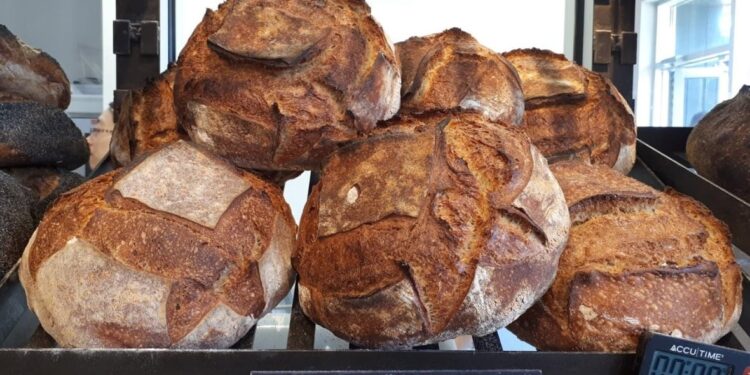Story, Louvier Kindo Tombe
In a small bakery tucked behind the main market in Ngoumo, in the Mefou and Akono Division of the Centre Region, the rhythmic thump of kneading dough fills the morning air. The scent of warm bread drifts outside, inviting early customers. But for baker Guy Marcel Nganta, each loaf is a mix of pride and frustration.
“Some days, the bread rises perfectly,” he says, wiping flour from his hands. “The next day, it collapses. We follow the same recipe, but the flour never behaves the same.”
Guy, promoter of GIC Verte Rouge Jaune in the Center region, is part of a growing movement of artisanal bakers in Cameroon turning away from imported wheat toward locally produced flours made from cassava, potatoes, and other homegrown crops.
Yet enthusiasm often meets hard reality. “I can’t satisfy my customers daily because getting enough local flour, even of acceptable quality, is not easy,” says Fomekon, another baker based in Douala.
The availability and quality of local flour remain major hurdles in the production and promotion of “Made in Cameroon” bread.
“The issue is that most processors of local crops don’t really follow norms,” explains Edoa Malanie Peggy from Yene Sarl, a local flour producer.
“Each adjusts the starch content differently, so results vary — and that’s a big problem for bakers.”
To tackle these challenges, a new project funded by the Agroecology Fund has been launched by the Service d’Appui aux Initiatives Locales de Développement (SAILD) in collaboration with the Citizens Action for Collective Interest (ACDIC).
The initiative aims to reinforce the capacity of artisanal bakeries in Cameroon, especially those incorporating local flours into bread and pastry making.
The project was officially launched in Yaoundé on Monday, October 6, 2025, at ACDIC’s head office.

“We strongly believe it is important to revive the conversation about incorporating local flour in bakery products, especially with Cameroon’s import substitution policy,” says Rodrigue Kouang, the project’s general supervisor.
“The timing couldn’t be better, given the global supply challenges that affect the cost of imported wheat.”
Through this initiative, the project seeks to promote agroecology, boost the local economy, and create jobs — all while producing bread that is truly Cameroonian.
It also aims to provide a platform for artisanal bakers to network, share experiences, and build a sustainable market for their products.
Recognizing that “the path from farm to oven” remains complicated, the project will also help identify opportunities for funding and partnerships to support these small-scale bakers.
Also present at the launch were several local flour processors, transforming crops like cassava, plantain, and potatoes into baking flour.
Their challenges are equally pressing. Many lack modern processing and drying equipment, making it difficult to produce flour that meets consistent standards. Distribution is another bottleneck, with bakeries sometimes going weeks without steady supply.
“It’s a normal phase of transition,” says Rodrigue Kouang. “We’re training both bakers and flour producers. Standardization is key if we want local bread to be competitive and trusted by consumers.”
The project’s scope goes beyond baking techniques. Workshops are designed to teach entrepreneurship, business management, and hygiene standards. Selected bakeries will receive technical assistance and equipment to help modernize production.
Ultimately, the goal is to create a seamless value chain — from farmer to processor to baker — ensuring that local crops don’t just sit in the field but reach tables across the country.
For many bakers, the initiative is a lifeline. “I want to bake with what our land gives,” says Léonie Talla, a young baker in Douala.
“It’s about more than bread, it’s about pride, sustainability, and giving local farmers a market for their produce.”
Despite the hurdles, hope persists. Training sessions scheduled throughout the project’s lifetime are expected to help bakers refine recipes, improve techniques, and adapt to the variability of local flours.
Some have even begun forming cooperatives to buy directly from processors, ensuring a steadier supply and fairer prices.








